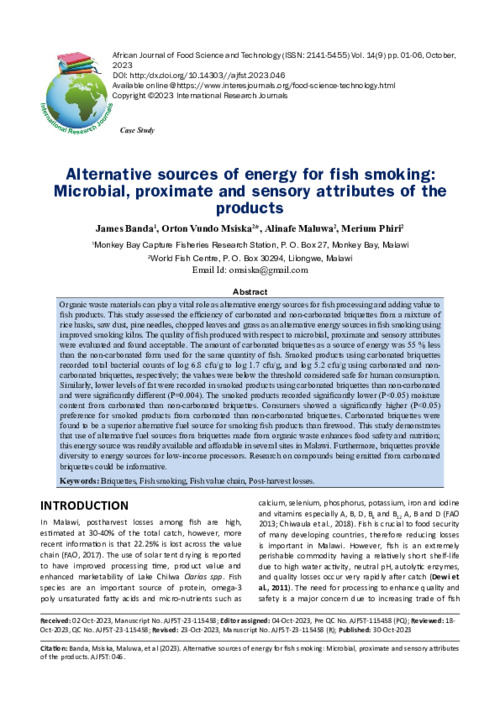Please use this identifier to cite or link to this item:
https://hdl.handle.net/20.500.12348/5955
Alternative sources of energy for fish smoking: Microbial, proximate and sensory attributes of the products
| dc.creator | Banda, J. | en_US |
| dc.creator | Msiska, O.V. | en_US |
| dc.creator | Maluwa, A. | en_US |
| dc.creator | Phiri, M. | en_US |
| dc.date.accessioned | 2024-04-25T06:59:48Z | |
| dc.date.available | 2024-04-25T06:59:48Z | |
| dc.date.issued | 2023 | en_US |
| dc.identifier.citation | James Banda, Orton Msiska, Alinafe Maluwa, Merium Phiri. (30/10/2023). Alternative sources of energy for fish smoking: Microbial, proximate and sensory attributes of the products. African Journal of Food Science and Technology, 14 (9). | en_US |
| dc.identifier.issn | 2141-5455 | en_US |
| dc.identifier.uri | https://hdl.handle.net/20.500.12348/5955 | |
| dc.description.abstract | Organic waste materials can play a vital role as alternative energy sources for fish processing and add value to fish products. This study assessed the efficiency of carbonated and non-carbonated briquettes made from a mixture of rice husks, sawdust, pine needles, chopped leaves, and grass as alternative energy sources in fish smoking using improved smoking kilns. The quality of fish produced with respect to microbial, proximate, and sensory attributes was evaluated and found acceptable. The amount of carbonated briquettes used as a source of energy was 55% less than the non-carbonated form used for the same quantity of fish. Smoked products using carbonated briquettes recorded total bacterial counts of log 6.8 cfu/g to log 1.7 cfu/g and log 5.2 cfu/g using carbonated and non-carbonated briquettes, respectively; the values were below the threshold considered safe for human consumption. Similarly, lower levels of fat were recorded in smoked products using carbonated briquettes than non-carbonated products and were significantly different (P = 0.004). The smoked products recorded significantly lower (P˂0.05) moisture content from carbonated than non-carbonated briquettes. Consumers showed a significantly higher (P<0.05) preference for smoked products made from carbonated briquettes than non-carbonated briquettes. Carbonated briquettes were found to be a superior alternative fuel source for smoking fish products than firewood. This study demonstrates that the use of alternative fuel sources from briquettes made from organic waste enhances food safety and nutrition; this energy source was readily available and affordable at several sites in Malawi. Furthermore, briquettes provide diversity in energy sources for low-income processors. Research on compounds being emitted from carbonated briquettes could be informative. | en_US |
| dc.format | en_US | |
| dc.language | en | en_US |
| dc.publisher | International Research Journals | en_US |
| dc.rights | Copyrighted; all rights reserved | en_US |
| dc.source | African Journal of Food Science and Technology;14,(2023) | en_US |
| dc.subject | post-harvest losses | en_US |
| dc.subject | fish value chain | en_US |
| dc.subject | fish smoking | en_US |
| dc.title | Alternative sources of energy for fish smoking: Microbial, proximate and sensory attributes of the products | en_US |
| dc.type | Journal Article | en_US |
| cg.contributor.funder | European Union, European Commission | en_US |
| cg.contributor.project | DESIRA: Climate Smart innovations to improve, productivity,profitability and Sustainability of Agriculture and Food System in Malawi through Multidisciplinary Research | en_US |
| cg.coverage.country | Malawi | en_US |
| cg.coverage.region | Eastern Africa | en_US |
| cg.subject.agrovoc | briquettes | en_US |
| cg.subject.agrovoc | fish | en_US |
| cg.contributor.affiliation | International Potato Center | en_US |
| cg.contributor.affiliation | WorldFish | en_US |
| cg.contributor.affiliation | 1Monkey Bay Capture Fisheries Research Station, P. O. Box 27, Monkey Bay, Malawi | en_US |
| cg.identifier.status | Open access | en_US |
| cg.contribution.worldfishauthor | Msiska, O.V. | en_US |
| cg.contribution.worldfishauthor | Maluwa, A. | en_US |
| cg.contribution.worldfishauthor | Phiri, M. | en_US |
| cg.description.theme | Sustainable aquaculture | en_US |
| cg.subject.sdg | SDG 1 - No poverty | en_US |
| cg.subject.sdg | SDG 2 - Zero hunger | en_US |
| cg.subject.sdg | SDG 14 - Life below water | en_US |
| cg.subject.impactArea | Nutrition, health and food security | en_US |
Files in this item
This item appears in the following Collection(s)
-
Sustainable aquaculture [2717]
